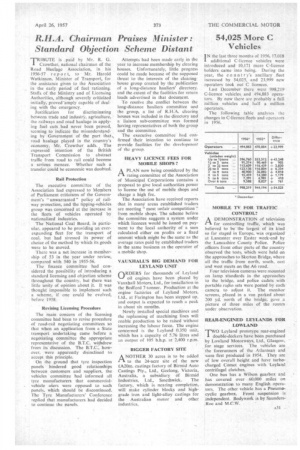R.H.A. Chairman Praises Minister : Standard Objection Scheme Distant
Page 33

If you've noticed an error in this article please click here to report it so we can fix it.
TRIBUTE is paid by Mr. R. G.
L Crowther, national chairman of the Road Haulage Association, in his 1956-57 rep o r t, to Mr. Harold Watkinson, Minister of Transport, for the assistance given to the Association in the early period of fuel rationing. Staffs of the Ministry and of Licensing Authorities, although severely criticized initially, proved-amply capable of dealing with the emergency.
Justification for discriminating between trade and industry, agriculture, the railways and road haulage in applying fuel cuts had never been proved, seeming to indicate the misunderstanding by Government of the part that., road haulage played in the country's economy, Mr. Crowther adds.. The expressed intention of the British Transport Commission to abstract traffic from road to rail could become a serious menace. Whether such a transfer could be economic was doubted.
Rail Protection The executive committee of the Association had expressed to Members of Parliament criticisms of the Government's " unwarranted " policy of railway protection, and the tipping-vehicles group was concerned at the increase in the fleets of vehicles operated by nationalized industries.
The National Coat Board, in particular, appeared to be providing an everexpanding fleet for the transport of coal. but had stressed its power of choice of the method by which its goods were to be moved.
There was a net increase in membership of 53 in the year under review, compared with 540 in 1955-56.
The finance committee had considered the possibility of introducing a standard licensing and objection scheme throughout the country, but there was little unity of opinion about it. It was thought impossible to implement such a scheme, if one could be evolved, before 1958.
Revising Licensing Procedure The Main concern of the licensing committee had been to revise procedure of road-rail negotiating committees so that when an application from a State transport undertaking came before a negotiating committee the appropriate representative of the B.T.C. wqtdrew from its discussion. The 13.T.C., however, were apparently disinclined to • accept this principle.
On the ground that tyre inspection panels hindered good relationships between customers and suppliers, the vehicles committee had informed all tyre manufacturers that commercial vehicle ukrs were opposed to such panels, which should be discontinued. The Tyre Manufacturers' Conference replied that manufacturers had decided to continue the panels. Attempts had been made early in the year to increase membership by clearing houses. Unfortunately, little progress could be made because of the supposed threat to the interests of the clearing. house group created by the publication of a long-distance hauliers' directory. and the extent of the facilities for return loads advertised in that document.
To resolve ..the conflict between the long-distance hauliers committee and the group, a list of R.11:A. clearing houses was included in the directory and a liaison sub-committee was formed having representatives of both the group and the committee.
The executive committee had confirmed their intention to continue to provide facilities for the development of the group.
HEAVY LICENCE FEES FOR MOBILE SHOPS?
APLAN now being considered by the rating committee of the Association of Municipal Corporations contains a proposal to give local authorities power to license the use of mobile shops and charge a high fee.
The Association have received reports that in many areas established traders are meeting " most unfair competition" from mobile shops, The scheme before the committee suggests a system under which licences would be issued on payment to the local authority of a sum calculated either on profits or a fixed amount which might be the same as the average rates paid by established traders in the same business as the operator of mobile shop.
VAUXHALL'S BIG DEMAND FOR LEYLAND UNIT
ORDERS for thousands _of Leyland oil engines have been placed by Vauxhall Motors, Ltd„ for installation in the Bedford 7-toriner, Production at the engine factories of Leyland Motors, Ltd., at Farington has, been stepped up, and output is expected to reach a peak in about six months.
Newly installed special machines and the replanning of machining lines will enable production to be raised without increasing the labour force. The engine concerned is the Leyland 0.350 unit, which has a capacity of 5.76 litres and an output of 105 b.h.p. at 2,400 r.p.m.
BIGGER FACTORY SITE
ANOTHER 30 acres is to be added to the 24-acre site of the new fA20rn. castings factory of Birmid Auto Castings Pty., Ltd., Geelong, Victoria, Australia, a subsidiary of Birmid Industries, Ltd., Smethwick, The factory, which is nearing completion, will make cylinder blocks and highgrade iron and light-alloy castings for the Australian motor and other industries,




























































































